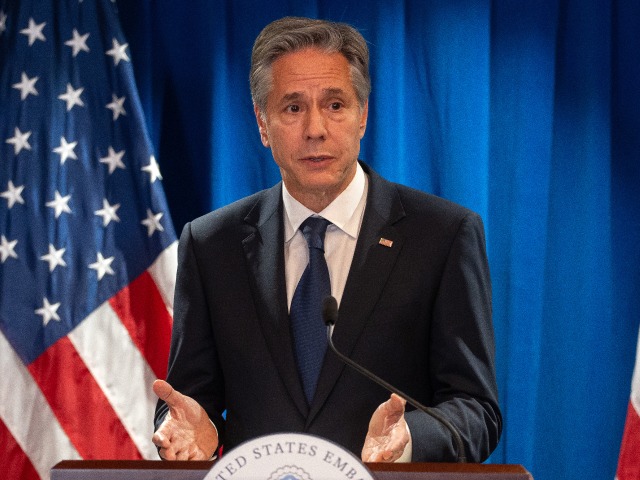Secretary of State Antony Blinken told the Senate Appropriations Committee on Tuesday there was no way to guarantee that some of the U.S. aid sent to Gaza would not be seized by Hamas terrorists, who are also the elected government of the territory.
“Can I promise you in this committee that there’ll be 100 percent delivery to the designated recipients? No, there will inevitably be some spillage,” Blinken said.
“We haven’t seen it to date, but I think we have to anticipate that,” he continued. “But the overwhelming, overwhelming majority of the assistance thus far is getting to people who need it. And we need more.”
He told the Senate:
Before the conflict in Gaza, before Hamas’s aggression against Israel and its response, the U.N. and other agencies and other organizations providing relief were sending in between 500 and 800 trucks a day. Right now, we’re up to almost 60. We’re trying to get to 100 this week.
Blinken claimed the Biden administration has worked with Israel, Egypt, U.N. agencies, and “other actors” to ensure humanitarian aid would reach Palestinian civilians without falling into the hands of “people who don’t need it,” presumably including Hamas.
According to the secretary of state, this system involves humanitarian shipments passing through Egypt’s Rafah border crossing into Gaza. The shipments are checked by Egyptian forces on their side of the border, and by the Israeli military once they enter Gaza.
“These trucks then go to distribution facilities that are run by U.N. agencies,” Blinken said. He said the deliveries can be monitored from there by “contacting the designated recipients to ensure that it’s actually gotten to where it’s supposed to go and not been diverted.”
Blinken wrote an op-ed for the Washington Post on Tuesday in which he argued that providing aid to the Palestinians was as “essential” as defending Israel.
Blinken’s op-ed argued against Congress splitting aid to Gaza and Israel into different bills than other spending demands, such as more aid for Ukraine. He said funding all of these goals at the same time would demonstrate “the United States’ unwavering resolve in standing with our allies and partners, standing up to autocrats and terrorists, and standing for an international order that safeguards America’s interests and values.”
Blinken said cutting humanitarian assistance to Gaza would “deepen the suffering of more than 2 million Palestinian civilians – including women, children, the elderly, people with disabilities and other vulnerable populations – who have nothing to do with Hamas’s deplorable attacks.”
EVIL: See the Aftermath of Hamas Attack on an Israeli KINDERGARTEN
“Palestinian civilians are not to blame for Hamas’s atrocities or for the grave humanitarian crisis in Gaza. They are its victims. As with civilians in any conflict, the lives of Palestinian civilians must be protected,” he said. “That means the flow of food, water, medicine, fuel and other essential humanitarian aid into Gaza must increase – immediately and significantly.”
Blinken admitted Hamas is a “monstrous” adversary that feels no commitment to human rights or the lives of civilians, either Palestinian or Israeli, which greatly increases the difficulty of getting assistance to noncombatants in Gaza. He contended that if the attempt is not made, the international community will have a hard time “finding partners in Gaza who have a different vision for the future than Hamas – and who are willing to help make it real,” he said.
“We can’t find those partners if they are consumed by a humanitarian catastrophe and alienated by our perceived indifference to their plight,” he wrote.
The UK Telegraph on Wednesday spoke with charity groups that said preventing Hamas from stealing humanitarian aid was extremely difficult, but they said that well-established charities could be of service because they know how to “navigate” the treacherous Gaza political terrain.
Conflict and Humanitarian Policy Chief James Denselow of Save the Children warned that if aid is not delivered swiftly enough, the situation in Gaza could “get even worse” as “civil order breaks down,” making the job of aid groups even harder.
The United Nations Relief and Works Agency for Palestine Refugees in the Near East (UNRWA) reported Hamas stealing large amounts of food and fuel from one of its depots in October. When the UNRWA bizarrely retracted this report, the Israeli Foreign Ministry accused the agency of trying to conceal massive theft by Hamas to avoid making the Palestinian terrorist organization look bad. U.S. sources told Israeli media the theft did indeed occur, and Hamas used some of the fuel it stole to power the diesel generators for its underground bases.
WATCH: Hamas Caught on Phone Call Admitting Stealing Fuel from Hospitals
